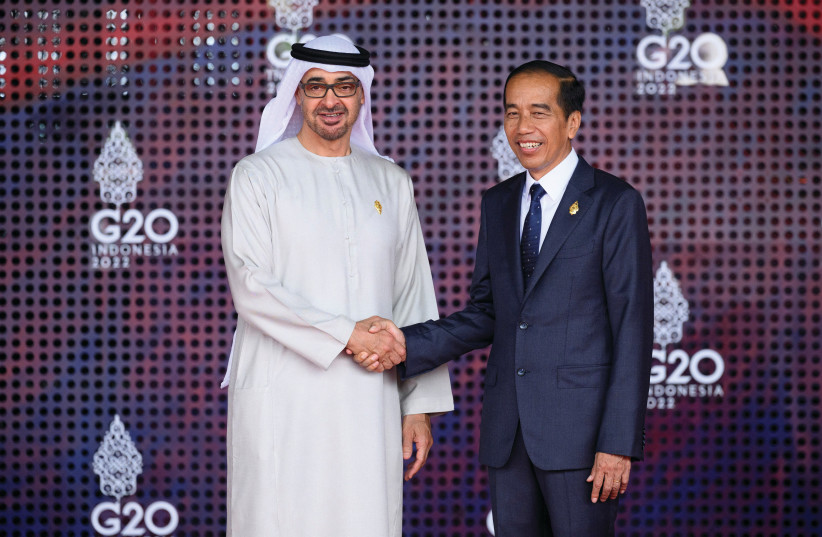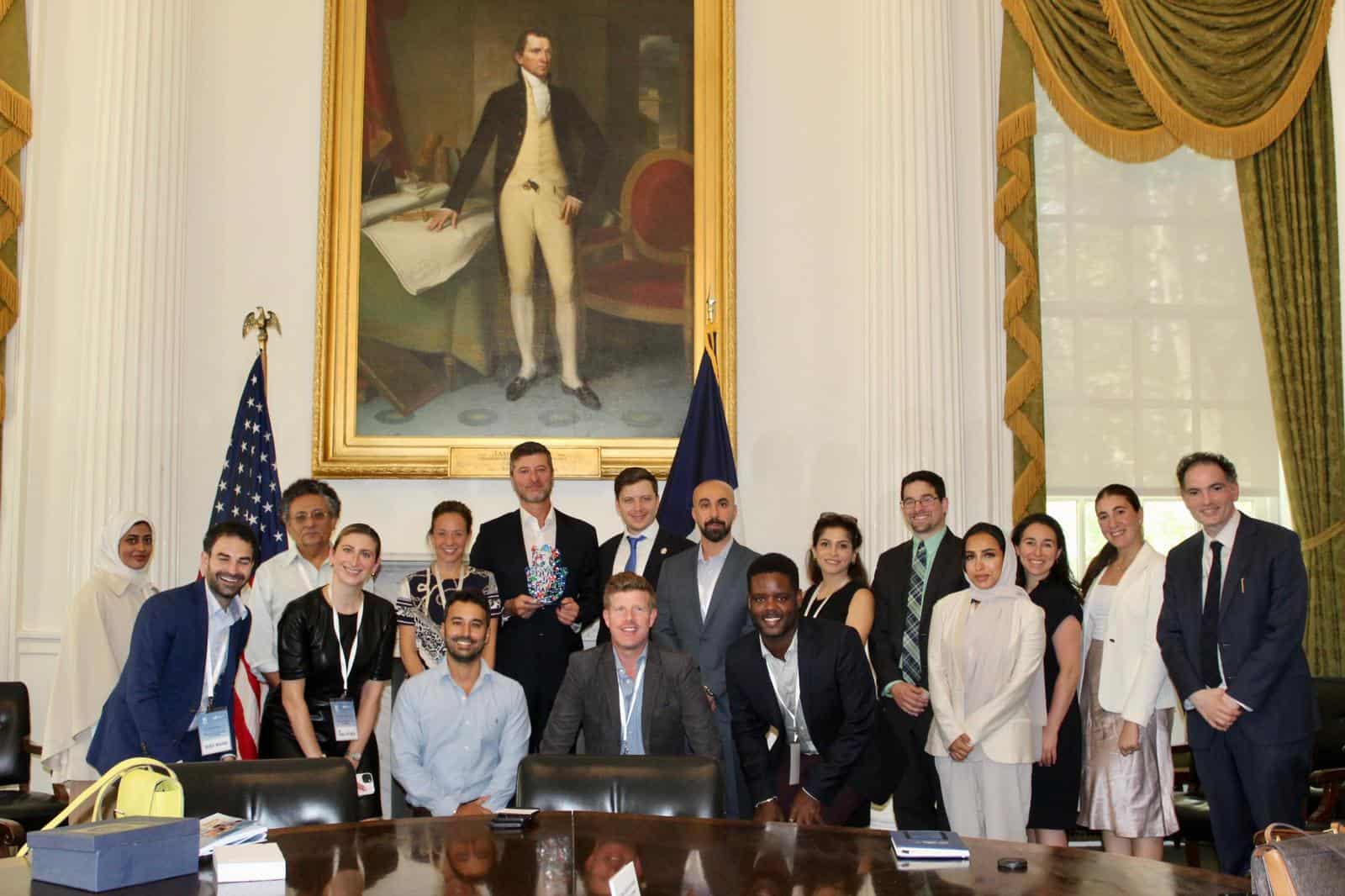Navigation
Install the app
How to install the app on iOS
Follow along with the video below to see how to install our site as a web app on your home screen.

Note: This feature currently requires accessing the site using the built-in Safari browser.
More options
You are using an out of date browser. It may not display this or other websites correctly.
You should upgrade or use an alternative browser.
You should upgrade or use an alternative browser.
Future Abraham accords?
- Thread starter shoshi
- Start date
Sixties Fan
Diamond Member
- Mar 6, 2017
- 54,050
- 10,464
- 2,140

Israel’s Consul General in Dubai Presents Credentials Ahead of Abraham Accords Anniversary
Flags of United Arab Emirates and Israel flutter during Israel’s National Day ceremony at Expo 2020 Dubai, in Dubai, United …
Sixties Fan
Diamond Member
- Mar 6, 2017
- 54,050
- 10,464
- 2,140
A total of 1,500 guests from around the world attended the wedding of Rabbi to the United Arab Emirates Levi Duchman on Wednesday in what is reportedly one of the largest Jewish events in the Arabian Gulf in recent history.
The Brooklyn-born rabbi, 29, married Lea Hadad, 27, from Brussels, Belgium, at the Hilton Yas Island in Abu Dhabi. Their wedding guests included prominent rabbis, dignitaries, Emirati royals, and members of the local Jewish community.
Hadad, who is of Moroccan heritage, is the daughter of Brussels Chief Rabbi Menachem Hadad. Her grandfather set up the Chabad community in Milan, Italy. The couple will live in Abu Dhabi and together continue Rabbi Duchman’s efforts to develop the UAE’s Jewish community.
“As the child of Chabad emissaries, I grew up in an open home,” she said. “People would come at all times for a meal or just for support, and I plan to do the same in Abu Dhabi.” The newlywed, who said she plans on learning Arabic, added, “I’m excited to live in the UAE. I look forward to supporting new families coming in and expanding our educational and social programs for those already there.”
The wedding coincided with the second anniversary of the Abraham Accords, which normalized relations between Israel, the UAE and Bahrain. The Hebrew date of the ceremony was also the same as the birthdate of the Baal Shemtov, the founder of the Chassidic movement, and the birthdate of Rabbi Schneur Zalman of Liadi, the founder of the Chabad-Lubavitch movement.
Since 2014, Rabbi Duchman has helped build the infrastructure of Jewish life in the UAE by establishing Jewish communities, institutions, schools and synagogues across Abu Dhabi and Dubai, including a mikvah and the government-licensed kosher agency. He brought other rabbis to the UAE to join him in leading the community and created a rabbinical training program for rabbinical interns. He also heads the Jewish Community Center of UAE in Dubai and serves as the rabbi of the Beit Tefilah Synagogue.

 www.algemeiner.com
www.algemeiner.com
The Brooklyn-born rabbi, 29, married Lea Hadad, 27, from Brussels, Belgium, at the Hilton Yas Island in Abu Dhabi. Their wedding guests included prominent rabbis, dignitaries, Emirati royals, and members of the local Jewish community.
Hadad, who is of Moroccan heritage, is the daughter of Brussels Chief Rabbi Menachem Hadad. Her grandfather set up the Chabad community in Milan, Italy. The couple will live in Abu Dhabi and together continue Rabbi Duchman’s efforts to develop the UAE’s Jewish community.
“As the child of Chabad emissaries, I grew up in an open home,” she said. “People would come at all times for a meal or just for support, and I plan to do the same in Abu Dhabi.” The newlywed, who said she plans on learning Arabic, added, “I’m excited to live in the UAE. I look forward to supporting new families coming in and expanding our educational and social programs for those already there.”
The wedding coincided with the second anniversary of the Abraham Accords, which normalized relations between Israel, the UAE and Bahrain. The Hebrew date of the ceremony was also the same as the birthdate of the Baal Shemtov, the founder of the Chassidic movement, and the birthdate of Rabbi Schneur Zalman of Liadi, the founder of the Chabad-Lubavitch movement.
Since 2014, Rabbi Duchman has helped build the infrastructure of Jewish life in the UAE by establishing Jewish communities, institutions, schools and synagogues across Abu Dhabi and Dubai, including a mikvah and the government-licensed kosher agency. He brought other rabbis to the UAE to join him in leading the community and created a rabbinical training program for rabbinical interns. He also heads the Jewish Community Center of UAE in Dubai and serves as the rabbi of the Beit Tefilah Synagogue.

UAE Rabbi Gets Married in Abu Dhabi; Reportedly Largest Jewish Event in Country’s History
Lea Duchman, the new bride of the UAE’s Rabbi Levi Duchman, circles the groom seven times as part of the …
Sixties Fan
Diamond Member
- Mar 6, 2017
- 54,050
- 10,464
- 2,140

Abraham Accords two years later: Economic collaboration and cultural exchange flourishing
Jared Kushner called the Abraham Accords a combination of the “right people, at the right places, at the right time working together.”
Sixties Fan
Diamond Member
- Mar 6, 2017
- 54,050
- 10,464
- 2,140

Young Israelis, Emiratis, Bahrainis, and Moroccans To Celebrate Anniversary of Abraham Accords
Israel-is delegation of young Israelis, Emiratis, Bahrainis, and Moroccans in Washington DC. Photo: Israel-Is. A coalition of young Israelis, Emiratis, …
Sixties Fan
Diamond Member
- Mar 6, 2017
- 54,050
- 10,464
- 2,140
Sixties Fan
Diamond Member
- Mar 6, 2017
- 54,050
- 10,464
- 2,140

Israel and Indonesia? Expanding Abraham Accords to Asia - opinion
Can Israel and Indonesia normalize diplomatic relations? It would be an Asian game-changer.
Sixties Fan
Diamond Member
- Mar 6, 2017
- 54,050
- 10,464
- 2,140
The peace between Israel and its Arab allies is increasingly tangible, with additional Muslim countries seeking to join the Abraham Accords, Israeli Intelligence Minister Gila Gamliel said Wednesday on Capitol Hill.
“Israel has signed peace accords with multiple Arab nations, and more want to join this initiative,” Gamliel said in a keynote address to lawmakers from the House of Representatives’ Congressional Israel Allies Caucus in an event marking Jerusalem Day. “The dynamics are changing and regional peace is tangible.”
The Likud Party minister noted that then-President Donald Trump’s historic decision in 2018 to move the American embassy to Jerusalem did not impede peace prospects as opponents of the move had long argued but rather improved them.
“Although intifadas and threats were declared as a reaction to these embassy moves, what we saw instead was the exact opposite,” she told the gathering in the Cannon House Office Building, which was also attended by hundreds of Jewish and Christian leaders bound by faith-based support for Israel.
The Abraham Accords, in which four Arab countries made peace with Israel, followed the US embassy move two years later in 2020.
Citing the words of King David regarding prayer and love for Jerusalem, Gamliel lauded the lawmakers for the unequivocal support at a time of rising anti-Israel voices as well as global antisemitism, and urged them to make their voices heard in the national and international arena.
She said that any division of Jerusalem would lead to the end of freedom of religion in a city holy to billions of people around the world.
(full article online)

 www.jns.org
www.jns.org
“Israel has signed peace accords with multiple Arab nations, and more want to join this initiative,” Gamliel said in a keynote address to lawmakers from the House of Representatives’ Congressional Israel Allies Caucus in an event marking Jerusalem Day. “The dynamics are changing and regional peace is tangible.”
The Likud Party minister noted that then-President Donald Trump’s historic decision in 2018 to move the American embassy to Jerusalem did not impede peace prospects as opponents of the move had long argued but rather improved them.
“Although intifadas and threats were declared as a reaction to these embassy moves, what we saw instead was the exact opposite,” she told the gathering in the Cannon House Office Building, which was also attended by hundreds of Jewish and Christian leaders bound by faith-based support for Israel.
The Abraham Accords, in which four Arab countries made peace with Israel, followed the US embassy move two years later in 2020.
Citing the words of King David regarding prayer and love for Jerusalem, Gamliel lauded the lawmakers for the unequivocal support at a time of rising anti-Israel voices as well as global antisemitism, and urged them to make their voices heard in the national and international arena.
She said that any division of Jerusalem would lead to the end of freedom of religion in a city holy to billions of people around the world.
(full article online)

Israel’s intelligence minister: More Arab states want to make peace
“The dynamics are changing and regional peace is tangible,” Gila Gamliel tells lawmakers on Capitol Hill.
Sixties Fan
Diamond Member
- Mar 6, 2017
- 54,050
- 10,464
- 2,140
The hope of the Abraham Accords was that its biggest impact would be felt on a people-to-people level. As the third anniversary of the signing of the original pact approaches, a delegation of young professionals from Israel, the United Arab Emirates, Bahrain and Morocco are touring America’s East Coast, looking to put that hope into action.
ISRAEL-is, an Israeli NGO dedicated to broadening the perspectives through which the world sees the Jewish state, is teaming with the American Jewish Committee to sponsor this year’s Abraham Accords Anniversary Delegation, which is meeting with a raft of thought leaders, professional executives, governmental leaders and key legislators to grow the fruits of the accords, particularly in the fields of tourism and the environment.
“We’re collaborating with a bunch of young, very brave leaders both from Israel and in the Arab world, and we want to impact the people who make decisions here in America that hey, this is the right place. This is the right agenda,” Nimrod Palmach, ISRAEL-is CEO, told JNS. “Let’s continue to support the Abraham Accords effort and believe in young leadership that are leading the way in a path of normalization, and hopefully peace.”
JNS met up with the delegation on Friday morning at AJC headquarters in New York, where they had meetings with Arab-American women leaders, along with a New York State tourism official and an environmental defense academic. The group had only met each other one day earlier.
“It’s been very interesting. It’s eye opening. We’ve learned so many things, especially since we just finished one day,” Leena al-Ayoubi, a Bahraini artist and designer and founder of NFT MENA, told JNS. “But in this one day, we’ve learned so much about the Jewish community, about New York tourism and especially Middle Eastern tourists.”
(full articles online)

 www.jns.org
www.jns.org
ISRAEL-is, an Israeli NGO dedicated to broadening the perspectives through which the world sees the Jewish state, is teaming with the American Jewish Committee to sponsor this year’s Abraham Accords Anniversary Delegation, which is meeting with a raft of thought leaders, professional executives, governmental leaders and key legislators to grow the fruits of the accords, particularly in the fields of tourism and the environment.
“We’re collaborating with a bunch of young, very brave leaders both from Israel and in the Arab world, and we want to impact the people who make decisions here in America that hey, this is the right place. This is the right agenda,” Nimrod Palmach, ISRAEL-is CEO, told JNS. “Let’s continue to support the Abraham Accords effort and believe in young leadership that are leading the way in a path of normalization, and hopefully peace.”
JNS met up with the delegation on Friday morning at AJC headquarters in New York, where they had meetings with Arab-American women leaders, along with a New York State tourism official and an environmental defense academic. The group had only met each other one day earlier.
“It’s been very interesting. It’s eye opening. We’ve learned so many things, especially since we just finished one day,” Leena al-Ayoubi, a Bahraini artist and designer and founder of NFT MENA, told JNS. “But in this one day, we’ve learned so much about the Jewish community, about New York tourism and especially Middle Eastern tourists.”
(full articles online)

Getting down to business: The Abraham Accords Anniversary Delegation - JNS.org
Israeli NGO ISRAEL-is has teamed up with the American Jewish Committee to sponsor this year’s Abraham Accords Anniversary Delegation, marking the Accords' third anniversary.
Sixties Fan
Diamond Member
- Mar 6, 2017
- 54,050
- 10,464
- 2,140
The most important change in the Arab world since the end of colonialism

Three years after they were signed, it is clear that the Abraham Accords were a game changer in the region, despite the many "Middle East experts" who tried to downplay ignore or disparage them.
But as the Saudis position themselves to make some sort of agreement with Israel, we see a more fundamental change taking place in the Arab world, one that has not been explored but that is even more important than normalization with Israel is.
From the time of their independence to today, most Arab nations have been mired in a prison of their own devising: of looking at the world through an honor/shame viewpoint. Instead of admitting mistakes they twist defeats into victories. Instead of compromising they insist on "honor" even when that results in more misery for their own people. Instead of looking for win/win solutions they look at the world as a zero-sum game where if the enemy wins, then by definition they lose.
Israel was a major part of this groupthink. Israel's very existence is the definition of shame - a small number of historically weak, second-class Jews defeated the combined armies of the mighty Arab world, and Israel's continued existence was regarded as a constant reminder of the profound shame they felt and an impetus to one day right those wrongs. Peace was impossible with a nation whose very existence reminds them of their shameful defeat.
This self-defeating mindset was so prevalent that the West, instead of undermining honor/shame as the single biggest obstacle to peace, accepted it as immutable and even adopted it to an extent. When Secretary of State John Kerry insisted in 2016 that no peace was possible between Israel and Arab nations without a Palestinian state, he was accepting honor/shame thinking as US policy.
When the Abraham Accords were announced I was one of the few who noticed that this was a major blow against the honor/shame, zero-sum mentality that was considered an integral part of the Arab world. Not only that, but honor/shame has been a major impediment to progress in the Arab world.
The UAE and Bahrain exposed Kerry's "hard reality" as being wildly wrong. They revealed to the Arab world a true "hard reality:" that Israel exists and it will not be destroyed militarily , economically or politically.
But they also showed the rest of the Arab world that they no longer need to be shackled by the myth that "honor/shame" is honorable. The UAE, Bahrain and Morocco have benefitted from their normalization with Israel, and the insults from the Palestinians and Iran - usually centered on trying to shame them - have not landed.
Palestinians still try to invoke shame to get the Arab world to do their bidding, but it no longer works. The success of the Abraham Accords has paved the way for other Arab countries, from Lebanon to Iraq to Saudi Arabia, to allow the conversations about whether it makes more sense to accept Israel than to be at war. Even the holdouts like Algeria, Libya and Tunisia feel shakier in their insistence on honor/shame thinking, publicly insisting or passing laws against normalization - something that shows that they are worried that their worldview is crumbling.
The Emiratis and the Saudis have realized that if their countries are going to progress and survive in a post-oil world, they need to change their thinking. The concept of "honor" has been used for decades as an excuse to repress their own people and maintain power. That won't work in a connected world where they are not only competing against each other but with every other country and region. Accepting Israel as an economic and military powerhouse that is integrated in their own Middle East makes more sense than wasting resources trying to destroy Israel and replace it with another failed Arab kleptocracy.
More broadly, it is impossible to imagine any Arab leadership in technology or other fields without the ability to admit and learn from mistakes, something that honor/shame thinking cannot accept.
In that sense, the Abraham Accords have been just the beginning of a sea change in Arab thinking, not just about Israel but about everything.
What about the Palestinians? Their leaders, like all Arab leaders, have a choice: truly accept Israel's existence and normalize relations with it which would improve their lives in myriad ways, or remain imprisoned in an honor/shame mentality. It isn't that the Gulf countries have abandoned them; the Gulf countries are simply leaving them behind because of their own self-harming choices.
This is not to say that the future is all rosy. There are plenty of things that could go wrong. But at this time, the Abraham Accords has been the spark that is slowly turning the Arab world away from the medieval mindset of honor/shame, and that alone is a reason for celebration.

The most important change in the Arab world since the end of colonialism
Blogging about Israel and the Arab world since, oh, forever.
- Thread starter
- #13
When Bahrain and the UAE signed the Abraham Accords everyone knew it wouldn’t happen without Saudi approvalThe most important change in the Arab world since the end of colonialism
Three years after they were signed, it is clear that the Abraham Accords were a game changer in the region, despite the many "Middle East experts" who tried to downplay ignore or disparage them.
But as the Saudis position themselves to make some sort of agreement with Israel, we see a more fundamental change taking place in the Arab world, one that has not been explored but that is even more important than normalization with Israel is.
From the time of their independence to today, most Arab nations have been mired in a prison of their own devising: of looking at the world through an honor/shame viewpoint. Instead of admitting mistakes they twist defeats into victories. Instead of compromising they insist on "honor" even when that results in more misery for their own people. Instead of looking for win/win solutions they look at the world as a zero-sum game where if the enemy wins, then by definition they lose.
Israel was a major part of this groupthink. Israel's very existence is the definition of shame - a small number of historically weak, second-class Jews defeated the combined armies of the mighty Arab world, and Israel's continued existence was regarded as a constant reminder of the profound shame they felt and an impetus to one day right those wrongs. Peace was impossible with a nation whose very existence reminds them of their shameful defeat.
This self-defeating mindset was so prevalent that the West, instead of undermining honor/shame as the single biggest obstacle to peace, accepted it as immutable and even adopted it to an extent. When Secretary of State John Kerry insisted in 2016 that no peace was possible between Israel and Arab nations without a Palestinian state, he was accepting honor/shame thinking as US policy.
When the Abraham Accords were announced I was one of the few who noticed that this was a major blow against the honor/shame, zero-sum mentality that was considered an integral part of the Arab world. Not only that, but honor/shame has been a major impediment to progress in the Arab world.
The UAE and Bahrain exposed Kerry's "hard reality" as being wildly wrong. They revealed to the Arab world a true "hard reality:" that Israel exists and it will not be destroyed militarily , economically or politically.
But they also showed the rest of the Arab world that they no longer need to be shackled by the myth that "honor/shame" is honorable. The UAE, Bahrain and Morocco have benefitted from their normalization with Israel, and the insults from the Palestinians and Iran - usually centered on trying to shame them - have not landed.
Palestinians still try to invoke shame to get the Arab world to do their bidding, but it no longer works. The success of the Abraham Accords has paved the way for other Arab countries, from Lebanon to Iraq to Saudi Arabia, to allow the conversations about whether it makes more sense to accept Israel than to be at war. Even the holdouts like Algeria, Libya and Tunisia feel shakier in their insistence on honor/shame thinking, publicly insisting or passing laws against normalization - something that shows that they are worried that their worldview is crumbling.
The Emiratis and the Saudis have realized that if their countries are going to progress and survive in a post-oil world, they need to change their thinking. The concept of "honor" has been used for decades as an excuse to repress their own people and maintain power. That won't work in a connected world where they are not only competing against each other but with every other country and region. Accepting Israel as an economic and military powerhouse that is integrated in their own Middle East makes more sense than wasting resources trying to destroy Israel and replace it with another failed Arab kleptocracy.
More broadly, it is impossible to imagine any Arab leadership in technology or other fields without the ability to admit and learn from mistakes, something that honor/shame thinking cannot accept.
In that sense, the Abraham Accords have been just the beginning of a sea change in Arab thinking, not just about Israel but about everything.
What about the Palestinians? Their leaders, like all Arab leaders, have a choice: truly accept Israel's existence and normalize relations with it which would improve their lives in myriad ways, or remain imprisoned in an honor/shame mentality. It isn't that the Gulf countries have abandoned them; the Gulf countries are simply leaving them behind because of their own self-harming choices.
This is not to say that the future is all rosy. There are plenty of things that could go wrong. But at this time, the Abraham Accords has been the spark that is slowly turning the Arab world away from the medieval mindset of honor/shame, and that alone is a reason for celebration.

The most important change in the Arab world since the end of colonialism
Blogging about Israel and the Arab world since, oh, forever.elderofziyon.blogspot.com
Trump's foreign policy shit was always a joke. He and his cult thought his stunt of claiming he delivered 'peace' to nations Not at War, was most about Trump's attempts to receive a Nobel Peace Prize. The man is obsessed with optics and money.
Similar threads
- Replies
- 1
- Views
- 65
- Replies
- 40
- Views
- 520
Latest Discussions
- Replies
- 12
- Views
- 60
Forum List
-
-
-
-
-
Political Satire 8069
-
-
-
-
-
-
-
-
-
-
-
-
-
-
-
-
-
-
-
ObamaCare 781
-
-
-
-
-
-
-
-
-
-
-
Member Usernotes 471
-
-
-
-
-
-
-
-
-
-
